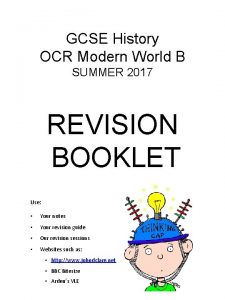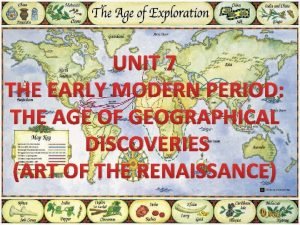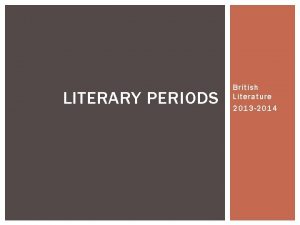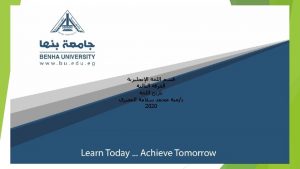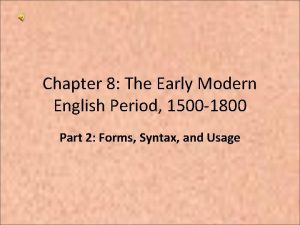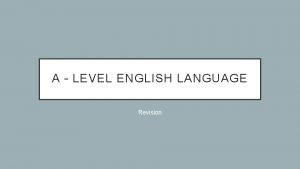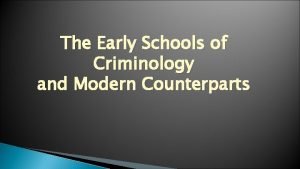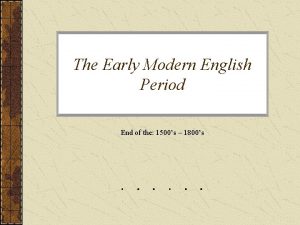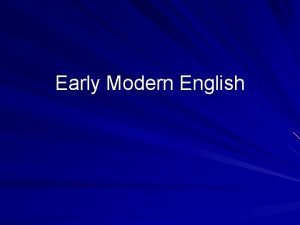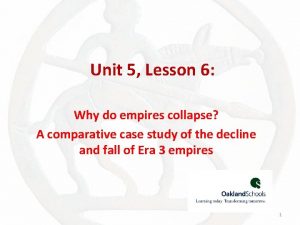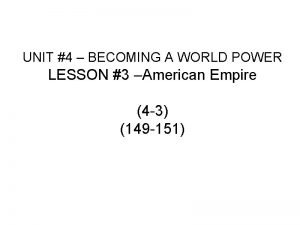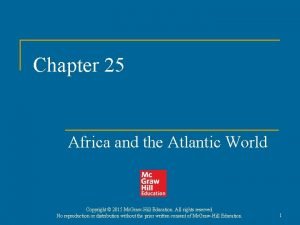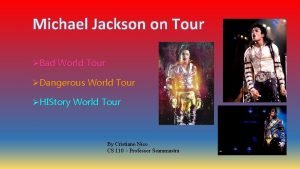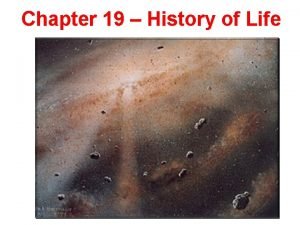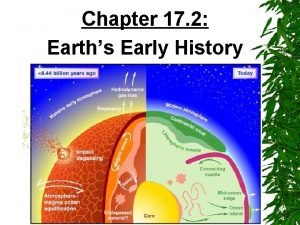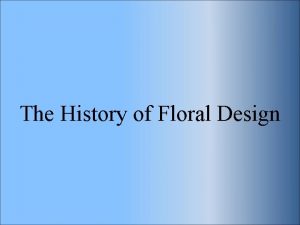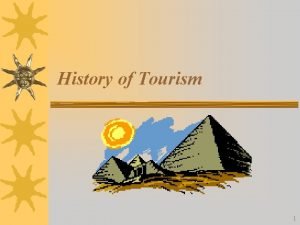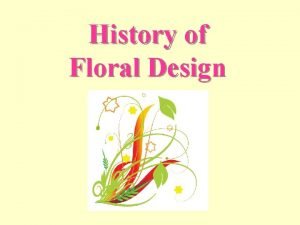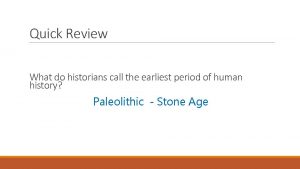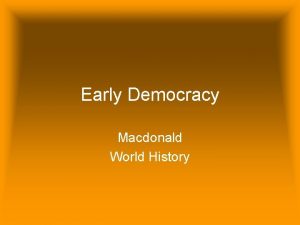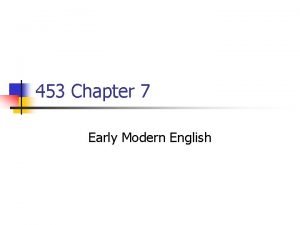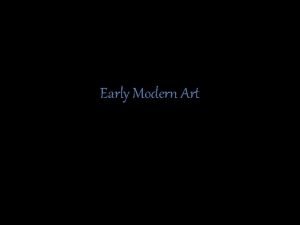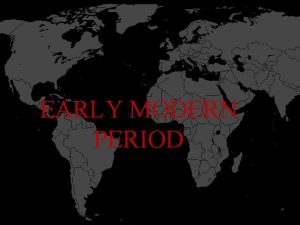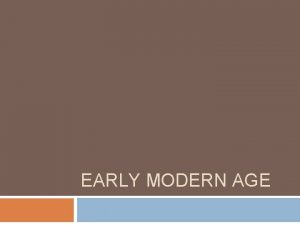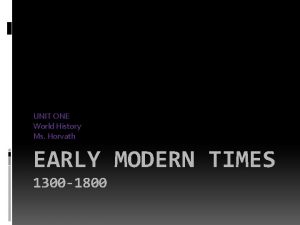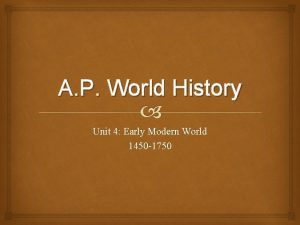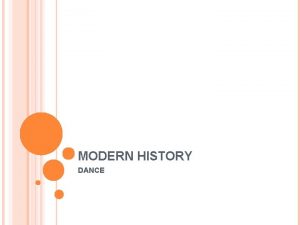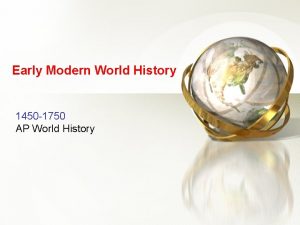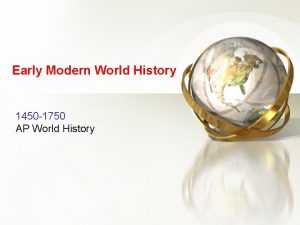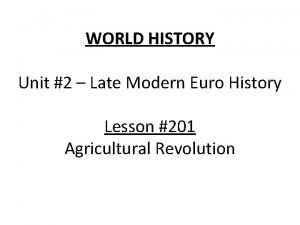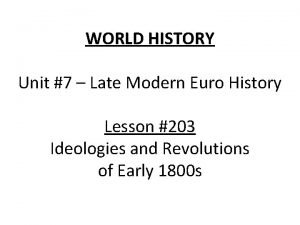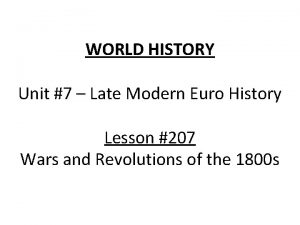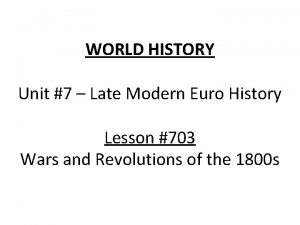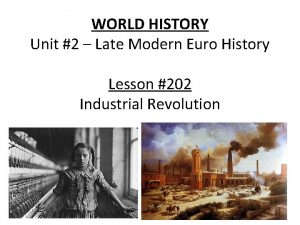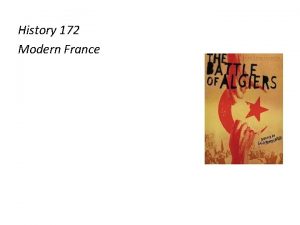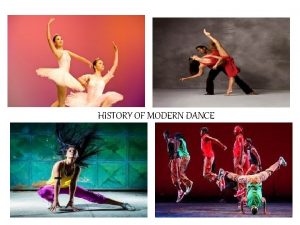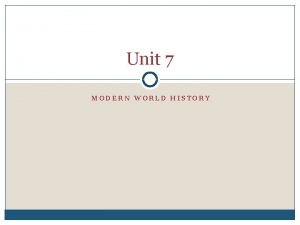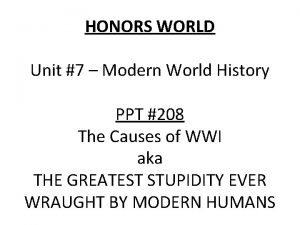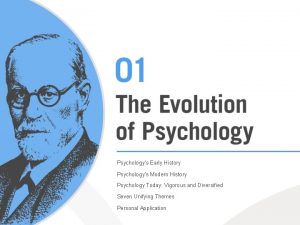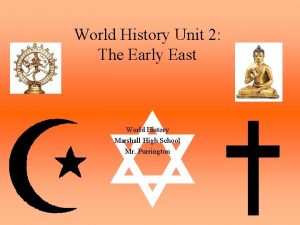World History Unit 4 The Early Modern World














































- Slides: 46

World History Unit 4 The Early Modern World 1350 - 1815

The Renaissance • AKA – Italian Renaissance • The word means “re-birth” – Rebirth of what? • Ancient Greek and Roman culture

Modern Period R i a en e c n a ss

Renaissance • Definition – Period of advancement in education, science, literature, art, and individualism. – CHANGE, CHANGE

Most Important Characteristics 1. Emergence of a secular worldview – Movement away from religious spiritual thinking 2. Belief in the individual – Renaissance Man – someone who knows a lot about a lot of things • • Not JUST Theology (study of God) Science, astronomy, politics, art, literature, etc.

Renaissance Men • Leonardo da Vinci – Artist – Sculptor – Architect – Inventor – Mathematician

Renaissance Writers • Petrach – Studied Greek and Rome manuscripts – Began Humanism – study of poetry, philosophy, and history – ( not about God) • Geoffrey Chaucer – Cantebury Tales – exposes coruption in the Church – Uses the venacular – local language

Renaissance Artist • Michelangelo – Sistine Chapel painting • Raphael – Italian painter that used Roman and Greek principles in art • Nudity

Renaissance Mathematicians • Nicolaus Copernicus – Argued for a sun centered universe – planets revolved around the sun • Galileo Galilei (Astronomer) – Invented a telescope • Isaac Newton – Gravity

Renaissance and Reform • What effect will the Renaissance have on the Church and its relationship with people? Causes direct conflict with the Church

The Protestant Reformation

Facts • • • When – 1500’s Where – Western Europe Who (Key people) – Erasmus, Martin Luther, Ulrich Zwingli, John Calvin – Pope Leo X – King Henry VIII • What - Divide of the Western church into Catholic and Protestant groups.

Rome Constantinople East West


Pope


Protestant Catholic


Why? 1. Renaissance thinking – Individualism – Humanism – teaching of the humanities • Christian Humanism - Erasmus – Christianity could show people how to live good lives stressing inward religious feeling not just external forms. 2. Corruption in the Catholic Church – Selling of Indulgences (seen in Luther’s 95 Thesis) – Administration of salvation by clergy (church official)

Martin Luther • Born in Germany • A monk and Professor at the University of Wittenberg • Luther’s problem – assurance of salvation – Catholic teaching was faith + works = salvation – Luther’s discovery was faith alone = salvation • “Justification by faith alone. ” protestant teaching • Gets his idea from his personal study and interpretation of the Bible.

95 Thesis excerpts 21. Hence those who preach indulgences are in error when they say that a man is absolved and saved from every penalty by the pope's indulgences. 27. There is no divine authority for preaching that the soul flies out of the purgatory immediately the money clinks in the bottom of the chest. 28. All those who believe themselves certain of their own salvation by means of letters of indulgence, will be eternally damned, together with their teachers.

95 Thesis excerpts 43. Christians should be taught that one who gives to the poor, or lends to the needy, does a better action than if he purchases indulgences. 44. Because, by works of love, love grows and a man becomes a better man; whereas, by indulgences, he does not become a better man, but only escapes certain penalties.

Important Events in the Reformation • • • 95 Thesis Edict of Worms – Luther was made an outlaw Invention of the Guttenberg Press – Allowed the spread of ideas – Like the internet today

Division in Protestantism • John Calvin – Close to Luther’s teaching – Predestination teaching • God has pre-determined who will be saved – Became most followed Protestantism – Church is the government • Anabaptists – Wanted a separation of Church and state – Church is a voluntary community – Baptism of adults

Politics in the Reformation • King Henry the 8 th – Wanted to divorce his first wife • Catholic church would not agree – Asks (persuades) the church in England (Canterbury) to annul the marriage – 1534 Persuades Parliament to break from the church. • Bloody Mary 1533 – Devout Catholic that wanted to restore the churches power in England – Had hundreds of protestants burned at the stake


1500 - 1800

Explore what?

The thinking about over there? • • World is flat? All that exist is Asia? Do not know how much ocean? How many miles is the earth around?

Why Explore? 1. God (religious zeal) – Convert (make them Christian) the natives of the lands

Why Explore? 2. Get rich (Gold) – European countries had interest in East Asian goods? – Marco Polo’s book “The Travels” • Talked about good stuff in East Indies

Europeans Euro pea ns West Indies

Why Explore? 3. Glory – Competing nations would beat the others – Become strongest of all European nations

Summary of Motives • God • Gold • Glory

Who is exploring? • Western European Nations – Spain – France – Portugal – England

Where did they Explore?

Key Explorers • Portugal – Vasco da Gama • Route around Africa • Spain – Christopher Columbus • Sails to Indies but land in Caribbean (Cuba) • 4 voyages – Ferdinand Magellan • Finds Strait of Magellan – a passage through the Americas • First to sail all the way around the world

Key Explorers • England – John Cabot • Explores the “New England” area – Amerigo Vespucci • Travels with Cabot • Realizes this is a “NEW WORLD”

Who Came to the New World? • Rich people – Proprietors – sent people to get the resources and bring them back • Poor people – looking for work and a new life • Religious people – looking to escape persecution – ill treatment – from the government. • Criminals the governments wanted to get rid of.

Analyzing Exploration • Creates different trade • Creates conflicts among nations • Creates need for colonies

Trade • • • Rich people invest Advancements & spread of technology Slave Trade Spread of disease Spread of religions and ideas

Role of Investment • • Transatlantic trade Mercantilism Joint stock companies Trading companies Government funding Corporations Capital Markets

Conflicts Among Nations • Conquest of New World • Conquistador destruction of Aztec and Inca’s • Competition for colonies

Staying in the New World • Colony – a settlement of people from one country living in another area.

Colonization • Desire for access of resources • Desire for new markets • Enslavement of indigenous people

Native Americans • Central and South America – Inca – Aztec – Mayans
 How useful is this source
How useful is this source Early cpr and early defibrillation can: *
Early cpr and early defibrillation can: * Early modern period dates
Early modern period dates Time line of literary periods in british literature
Time line of literary periods in british literature Early modern english syntax
Early modern english syntax Early modern english
Early modern english Thou/thee in modern english
Thou/thee in modern english Neo (modern) biological positivism
Neo (modern) biological positivism Early modern english period
Early modern english period Modern english time period
Modern english time period World history unit 5 lesson 6
World history unit 5 lesson 6 World history unit 4 lesson 3
World history unit 4 lesson 3 Ap world history chapter 25 africa and the atlantic world
Ap world history chapter 25 africa and the atlantic world History world tour
History world tour Unit 6 review questions
Unit 6 review questions Section 17-2 earth's early history
Section 17-2 earth's early history 17-2 earth's early history
17-2 earth's early history Section 17-2 earth's early history
Section 17-2 earth's early history French rococo floral design
French rococo floral design Early beginnings of tourism
Early beginnings of tourism Egyptian floral design time period
Egyptian floral design time period What do historians call the early period of human history
What do historians call the early period of human history Hát kết hợp bộ gõ cơ thể
Hát kết hợp bộ gõ cơ thể Slidetodoc
Slidetodoc Bổ thể
Bổ thể Tỉ lệ cơ thể trẻ em
Tỉ lệ cơ thể trẻ em Voi kéo gỗ như thế nào
Voi kéo gỗ như thế nào Chụp tư thế worms-breton
Chụp tư thế worms-breton Alleluia hat len nguoi oi
Alleluia hat len nguoi oi Các môn thể thao bắt đầu bằng tiếng chạy
Các môn thể thao bắt đầu bằng tiếng chạy Thế nào là hệ số cao nhất
Thế nào là hệ số cao nhất Các châu lục và đại dương trên thế giới
Các châu lục và đại dương trên thế giới Công thức tính độ biến thiên đông lượng
Công thức tính độ biến thiên đông lượng Trời xanh đây là của chúng ta thể thơ
Trời xanh đây là của chúng ta thể thơ Mật thư anh em như thể tay chân
Mật thư anh em như thể tay chân Làm thế nào để 102-1=99
Làm thế nào để 102-1=99 Phản ứng thế ankan
Phản ứng thế ankan Các châu lục và đại dương trên thế giới
Các châu lục và đại dương trên thế giới Thể thơ truyền thống
Thể thơ truyền thống Quá trình desamine hóa có thể tạo ra
Quá trình desamine hóa có thể tạo ra Một số thể thơ truyền thống
Một số thể thơ truyền thống Cái miệng nó xinh thế
Cái miệng nó xinh thế Vẽ hình chiếu vuông góc của vật thể sau
Vẽ hình chiếu vuông góc của vật thể sau Thế nào là sự mỏi cơ
Thế nào là sự mỏi cơ đặc điểm cơ thể của người tối cổ
đặc điểm cơ thể của người tối cổ Ví dụ giọng cùng tên
Ví dụ giọng cùng tên Vẽ hình chiếu đứng bằng cạnh của vật thể
Vẽ hình chiếu đứng bằng cạnh của vật thể
